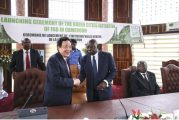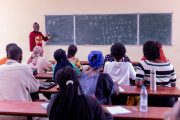Categories
Recent Posts
- Southern Cameroons refugees in Nigeria receive farm seedlings
- Douala: Investment Forum wraps up with honors for investment champions
- Understanding the Biya Francophone regime’s support for the Israeli genocide in Gaza
- US: Prosecution lays out ‘criminal conspiracy’ as Trump’s hush money trial opens
- FAO formally launches Green Cities Initiative in Cameroon
Archives
- April 2024
- March 2024
- February 2024
- January 2024
- December 2023
- November 2023
- October 2023
- September 2023
- August 2023
- July 2023
- June 2023
- May 2023
- April 2023
- March 2023
- February 2023
- January 2023
- December 2022
- November 2022
- October 2022
- September 2022
- August 2022
- July 2022
- June 2022
- May 2022
- April 2022
- March 2022
- February 2022
- January 2022
- December 2021
- November 2021
- October 2021
- September 2021
- August 2021
- July 2021
- June 2021
- May 2021
- April 2021
- March 2021
- February 2021
- January 2021
- December 2020
- November 2020
- October 2020
- September 2020
- August 2020
- July 2020
- June 2020
- May 2020
- April 2020
- March 2020
- February 2020
- January 2020
- December 2019
- November 2019
- October 2019
- September 2019
- August 2019
- July 2019
- June 2019
- May 2019
- April 2019
- March 2019
- February 2019
- January 2019
- December 2018
- November 2018
- October 2018
- September 2018
- August 2018
- July 2018
- June 2018
- May 2018
- April 2018
- March 2018
- February 2018
- January 2018
- December 2017
- November 2017
- October 2017
- September 2017
- August 2017
- July 2017
- June 2017
- May 2017
- April 2017
- March 2017
- February 2017
- January 2017
- December 2016
- November 2016
- October 2016
- September 2016
- August 2016
- July 2016
- June 2016
Featured
 Understanding the Biya Francophone regime’s support for the Israeli genocide in Gaza
Understanding the Biya Francophone regime’s support for the Israeli genocide in Gaza  Poverty under Biya: Cameroonians embrace Chinese language for brighter futures
Poverty under Biya: Cameroonians embrace Chinese language for brighter futures  Cameroon is broken: Who can fix it?
Cameroon is broken: Who can fix it?  Ethiopia: U.S Senator Cardin Statement on the Killing of Bate Urgessa
Ethiopia: U.S Senator Cardin Statement on the Killing of Bate Urgessa  Battle for the Unity Palace: ANNOUNCEMENT!
Battle for the Unity Palace: ANNOUNCEMENT!
Most Commented Posts
 4 Anglophone detainees killed in Yaounde
4 Anglophone detainees killed in Yaounde
19 comments Chantal Biya says she will return to Cameroon if General Ivo Yenwo, Martin Belinga Eboutou and Ferdinand Ngoh Ngoh are sacked
Chantal Biya says she will return to Cameroon if General Ivo Yenwo, Martin Belinga Eboutou and Ferdinand Ngoh Ngoh are sacked
13 comments Anglophone Nationalism: Barrister Eyambe says “hidden plans are at work”
Anglophone Nationalism: Barrister Eyambe says “hidden plans are at work”
12 comments The Anglophone Problem – When Facts don’t Lie
The Anglophone Problem – When Facts don’t Lie
12 comments Largest wave of arrest by BIR in Bamenda
Largest wave of arrest by BIR in Bamenda
10 comments
Latest Tweets
Featured
-

Southern Cameroons refugees in Nigeria receive farm seedlings
-

Douala: Investment Forum wraps up with honors for investment champions
-

Understanding the Biya Francophone regime’s support for the Israeli genocide in Gaza
-

US: Prosecution lays out ‘criminal conspiracy’ as Trump’s hush money trial opens
-

FAO formally launches Green Cities Initiative in Cameroon
-

Football: Barcelona wants Clasico replay if Yamal ‘ghost goal’ call wrong
-

Poverty under Biya: Cameroonians embrace Chinese language for brighter futures
© Cameroon Concord News 2024
26, February 2020
Southern Cameroons-French Cameroun Crisis: No dialogue between close enemies 0
As the number of victims continues to pile up, the possibility of holding talks to end the Anglophone crisis seems remote.
A united family.
In the foreground sits a gold and coral tiered cake which matches the first lady’s dress. An immaculately dressed Paul Biya wears the hint of a smile.
For his 87th birthday, the head of state is surrounded by his loves ones: Franck, his son, two of his granddaughters and, of course, his wife Chantal. On this day, 13 February, only the sound of the water streaming down into the fountains of his home in Mvomeka’a seems capable of disturbing the calm of the Biya clan.
On 14 February, the din of bullets put an end to the tranquillity of the presidential fountains in the south.
At 2 p.m., soldiers burst into the neighbourhood of Ngarbuh in the North-West region. The death toll: 23, according to the United Nations Office for the Coordination of Humanitarian Affairs, including 15 children, nine of whom were under the age of five. According to witness accounts, their bodies were burned at the same time as homes.
As the smoke subsides, indignation rises. Felix Agbor Mballa, lawyer and chairman of the Centre for Human Rights and Democracy in Africa (CHRDA), condemned “the horrible murder” of women and children “by the state defence forces,” with army spokesperson Colonel Cyrille Atonfack Guemo tersely retorting that “the Cameroonian defence and security forces were not involved in this massacre.”Daily newsletter: join our 100 000 subscribers!Each day, get the essential: 5 things you need to know Sign up Also receive offers from The Africa ReportAlso receive offers from The Africa Report’s partners
Who can be believed? A few hours later, the defence minister called the killings a “regrettable incident.” The army is believed to have attacked a “fortified camp” of Ambazonian separatists and “the explosion of several fuel containers” killed “five victims, including a woman and four children, far from what is reported in social networks.”
An investigation has been opened by the national gendarmerie and military security.
Mballa tweeted that “an independent commission of inquiry should be set up to investigate the killings” and “should include members of the civil society, clergy and government.” Opposition figure Akere Muna lamented that “Suffering, death and killing are now the new normal.” At the time of this writing, President Biya had not publicly addressed the crisis, despite the growing violence these past months.
On 15 January, a young man was killed and his father injured near Bamenda as they tried to avoid the security checkpoints manned by separatists. On 23 January, soldiers attacked the village of Ndoh in the South-West region, killing 14. An endless litany of such acts has been perpetrated since 2017.
At least 8,000 Cameroonians have fled to Nigeria in the past three weeks, taking the number of refugees up to more than 60,000. In addition, some 680,000 people have been displaced by the conflict. In three years, the violence has killed at least 3,000 people.
Acts of violence and retaliations
Local communities, caught in a vice between an army accused of committing acts of violence and separatists keen to launch retaliatory attacks, are living in the grip of fear.
On 9 February, the day of parliamentary and municipal elections, polling stations in the Anglophone regions were empty.
A person close to the country’s top leaders commented: “Why did the government organise elections when they knew that the Anglophones couldn’t go out and vote? It just reinforces the idea that they’re not a part of Cameroon. The government has focused on a political solution, but that doesn’t change the fact that, facing poorly equipped guerrilla forces, the army isn’t capable of resolving the situation.”
Recently, there have been calls for the withdrawal of military forces and the introduction of African Union (AU) or UN peacekeeping forces. A letter on the matter was even recently sent to President Biya, but it has not received a response.
In reality, Cameroon’s diplomats have been working to discourage any foreign intervention. The country’s Minister of External Relations Lejeune Mbella, who represented Biya at the AU Summit held in Addis Ababa in early February, passed on a message to the Chairperson of the AU Commission, Moussa Faki Mahamat, who has expressed concern over the deterioration of the situation.
In essence, Mbella claimed that things are starting to go back to normal and repeated the dictum hammered home by Prime Minister Joseph Dion Ngute over the past months: a firm response on the ground and the implementation of measures put forward – namely increased decentralisation – at the Major National Dialogue held in October 2019.
According to Eric Chinje, a former journalist who took part in the dialogue, “We’ve been waiting for four months now, but nothing has been done. The government needs to give its Anglophone citizens grounds to believe in its good faith.”
“The time for dialogue has passed. We’ve entered the reform implementation phase,” said a Cameroonian adviser in Addis Ababa. “Foreigners have to respect our sovereign will. We’re well aware that the only motive behind their interference is to drive out President Biya,” he added, referring to the Americans.
As it happens, the response of Tibor Nagy, Assistant Secretary for the US Department of State’s Bureau of African Affairs, to the crisis has been very active, from Washington DC to Addis Ababa, not to mention within the United Nations Security Council in New York City.
A game of influence
According to a diplomat involved in the feud, “The US and France are in a battle. The Americans are promoting a sanctions-based policy, while the French are supporting the Cameroon government’s narrative and blocking any initiative by the UN.”
Moreover, the UN prefers to err on the side of caution and wait for the AU to take a stance. But can the AU intervene? In Addis Ababa, Biya (who never goes there) is backed by his Central African peers, particularly Chad’s President Idriss Déby Itno.
According to a document we obtained, the Cameroonian conflict was discussed during a closed meeting at the most recent AU summit.
However, the pan-African organisation restricted itself to commending the government for “having held a national dialogue” and “giving peace a chance.” The same diplomat quoted above commented: “Cameroon can just grin and bear it until the West starts to look away.”
In Yaoundé, the game of influence playing out within the president’s inner circle is further paralysing the situation. Some members have taken on the role of “hawks,” such as Samuel Mvondo Ayolo, Civil Cabinet Director, and Paul Atanga Nji, Territorial Administration Minister.
Others, like the prime minister, act tough while simultaneously attempting to quietly negotiate with Ambazonian separatists.
Lastly, a few people from the inner circle of Ferdinand Ngoh, the president’s Secretary-General, are encouraging talks entrusted to a third party outside Cameroon.
Will the possibility of a succession battle for the president’s top spot, the date of which everyone is clearly in the dark about, encourage the war’s continuation?
“Biya lets different policies co-exist without giving official guidelines, which blocks the entire process,” said a person involved in the matter. He has made a political art of this management style for several decades now.
According to a source close to the president, “He seems paralysed by a system he himself was the architect of. But does he want his political legacy to be a country torn by bloodshed?”
Empty-chair strategy
According to our sources, the government does not intend to send a representative to the symposium organised in Kenya in April by the Africa Forum, a grouping of former African heads of state and government. “It’s a foreign initiative that doesn’t concern us,” said a Cameroonian diplomat.
As for the talks initiated with the Ambazonians under the auspices of the Centre for Humanitarian Dialogue (HD), they have reached a standstill. The government decided to withdraw from them at least until the measures set out at the Major National Dialogue in October 2019 are implemented.
Two other international meetings that seek to find a solution to the crisis will be held at the end of March in Potsdam, Germany and Washington DC, but once again, Cameroon’s authorities will not be in attendance.
Source: The Africa Report